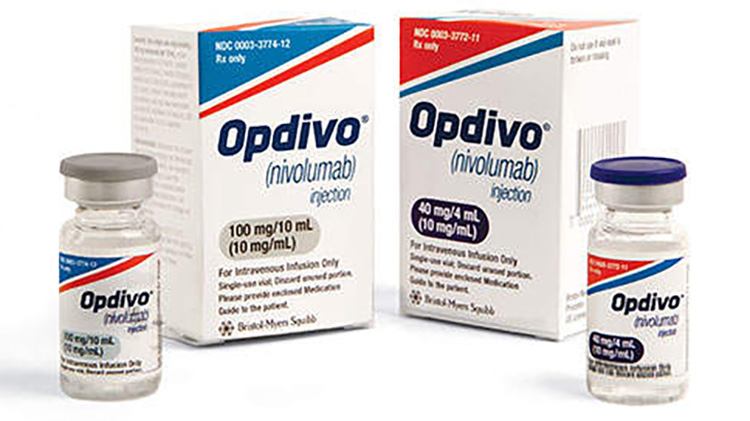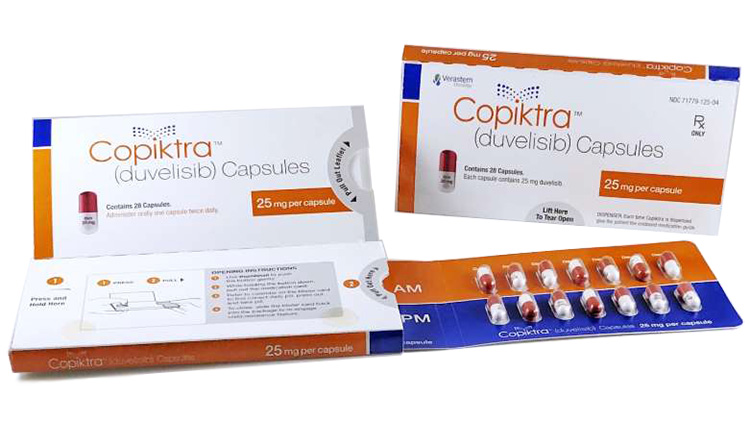Opdivo (Nivolumab) vs Copiktra (duvelisib)
Opdivo (Nivolumab) vs Copiktra (duvelisib)
Opdivo (nivolumab) is an immune checkpoint inhibitor that works by blocking the PD-1 protein on T cells, thereby enhancing the immune system's ability to attack cancer cells, and is commonly used for various types of cancers, including melanoma, lung cancer, and kidney cancer. Copiktra (duvelisib) is a PI3K inhibitor that targets cancer cells by blocking the PI3K-delta and PI3K-gamma pathways, leading to the death of cancer cells, and is approved for chronic lymphocytic leukemia (CLL), small lymphocytic lymphoma (SLL), and follicular lymphoma. When deciding between Opdivo and Copiktra, it is crucial to consider the specific type of cancer being treated, the patient's overall health, and the side effect profile of each medication, as well as consulting with a healthcare professional who can provide personalized advice based on the patient's medical history and current condition.
Difference between Opdivo and Copiktra
| Metric | Opdivo (Nivolumab) | Copiktra (duvelisib) |
|---|---|---|
| Generic name | Nivolumab | Duvelisib |
| Indications | Various types of cancer, including melanoma, lung cancer, kidney cancer, bladder cancer, head and neck cancer, and more. | Chronic lymphocytic leukemia (CLL), small lymphocytic lymphoma (SLL), and follicular lymphoma (FL). |
| Mechanism of action | PD-1 inhibitor that enhances T-cell function against cancer cells. | PI3K inhibitor that reduces the survival and growth of cancer cells. |
| Brand names | Opdivo | Copiktra |
| Administrative route | Intravenous infusion | Oral |
| Side effects | Fatigue, rash, musculoskeletal pain, pruritus, diarrhea, nausea, weakness, upper respiratory tract infection, and more. | Diarrhea, neutropenia, rash, fatigue, fever, cough, nausea, upper respiratory tract infection, pneumonia, and more. |
| Contraindications | Known hypersensitivity to nivolumab or any of its excipients. | Known hypersensitivity to duvelisib or any of its excipients, history of severe allergic reactions to other PI3K inhibitors. |
| Drug class | Immune checkpoint inhibitor, monoclonal antibody. | Phosphoinositide 3-kinase inhibitor. |
| Manufacturer | Bristol-Myers Squibb | Secura Bio, Inc. |
Efficacy
Efficacy of Opdivo (Nivolumab) in Lymphoma
Opdivo (Nivolumab) is a programmed death receptor-1 (PD-1) blocking antibody used in cancer immunotherapy. It has shown efficacy in treating several types of cancer, including lymphoma. Specifically, in Hodgkin lymphoma, Nivolumab has been granted approval by regulatory agencies for use in patients who have relapsed or refractory classical Hodgkin lymphoma after autologous stem cell transplant and brentuximab vedotin. Clinical trials have demonstrated that Nivolumab can induce a response in a significant proportion of these patients, with some achieving complete remission. The overall response rate in pivotal trials was notable, indicating that Nivolumab is an effective treatment option for patients with limited alternatives due to the refractory nature of their disease.
Efficacy of Copiktra (Duvelisib) in Lymphoma
Copiktra (Duvelisib) is a dual inhibitor of phosphoinositide 3-kinase (PI3K)-delta and gamma and is used in the treatment of certain hematologic malignancies. It has been approved for the treatment of adult patients with relapsed or refractory chronic lymphocytic leukemia/small lymphocytic lymphoma (CLL/SLL) after at least two prior therapies. In addition, Duvelisib has shown efficacy in treating follicular lymphoma after two or more prior systemic therapies. The drug has demonstrated an ability to achieve partial and complete responses in a subset of patients, offering another therapeutic option for those who have progressed on or are intolerant to other treatments. The response rates observed in clinical trials support its use in these indications, although the safety and efficacy profile must be carefully considered in the context of the individual patient's overall health status and prior treatments.
Both Opdivo and Copiktra represent advances in the targeted treatment of lymphoma, providing options for patients who have exhausted other therapies. The efficacy of these drugs underscores the importance of continued research and development in the field of oncology, particularly for diseases with high unmet medical needs. As with all medications, the use of Nivolumab and Duvelisib should be guided by a thorough understanding of the potential benefits and risks, and a consideration of the individual patient's disease characteristics and prior treatment history.
It is important to note that while the efficacy of these drugs in the treatment of lymphoma is supported by clinical trials, individual responses to therapy can vary. Healthcare providers should remain vigilant in monitoring patients on these treatments for response and adverse effects, and should engage in shared decision-making with patients regarding their treatment options. Ongoing clinical trials and post-marketing surveillance continue to provide additional data on the long-term efficacy and safety of these drugs in various lymphoma populations.
Regulatory Agency Approvals
Opdivo
-
European Medical Agency (EMA), European Union

-
Food and Drug Administration (FDA), USA

-
Health Canada

-
Pharmaceuticals and Medical Devices Agency (PMDA), Japan

-
Therapeutic Goods Administration (TGA), Australia

-
Medsafe (NZ)

Copiktra
-
European Medical Agency (EMA), European Union

-
Food and Drug Administration (FDA), USA

Access Opdivo or Copiktra today
If Opdivo or Copiktra are not approved or available in your country (e.g. due to supply issues), you can access them via Everyone.org.
How it works

Make an enquiry
Choose the medicine you want to buy, answer a couple of questions, and upload your prescription to speed things up. We’ll get back to you within 24 hours.


Make an enquiry
Choose the medicine you want to buy, answer a couple of questions, and upload your prescription to speed things up. We’ll get back to you within 24 hours.


Breeze through the paperwork
We'll guide you through the required documents for importing unapproved medicine, ensuring you have all the necessary information.


Get a personalized quote
We’ll prepare a quote for you, including medicine costs and any shipping, administrative, or import fees that may apply.


Receive your medicine
Accept the quote and we’ll handle the rest - sourcing and safely delivering your medicine.

Some text on this page has been automatically generated. Speak to your physician before you start a new treatment or medication.
Let's talk
If you have any questions, call us or send us a message through WhatsApp or email:
Contact us




